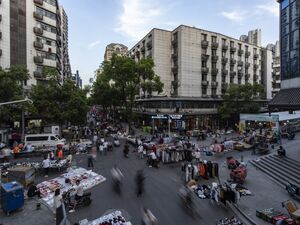Russian Firms Turn to Crypto for China Commodities Trade
- Some unsanctioned firms use Tether stablecoin for transactions
- Russian companies face issues with settling cross-border deals
Russian commodities firms struggling to execute financial transactions with Chinese counterparts have started tapping a new method for settling deals — stablecoins.
At least two top metals producers, both of which are unsanctioned, have begun to use Tether Holdings Ltd.’s stablecoin and some other cryptocurrencies to settle some of their cross-border transactions with mostly Chinese clients and suppliers, top executives at the companies said, declining to be identified as the information isn’t public. In some cases, the settlements go through Hong Kong.
That large Russian firms are now turning to blockchain two years after the start of the February 2022 invasion of Ukraine underscores the lasting effect international restrictions in response to the war have had on the economy. Russian companies dealing in commodities from metals, like nickel and steel, to timber have been facing challenges with receiving payments for their goods and purchasing equipment and raw materials since the beginning of the conflict. That’s true even when they aren’t sanctioned, though some have come under multiple penalties from the US, the European Union and their allies.
Even in China, which didn’t join international sanctions and has become the main export market for multiple Russian commodities as well as a supplier of goods and equipment, financial transactions have grown more difficult this year. That’s in large part due to the US Treasury Department threatening secondary sanctions on lenders facilitating sanctions evasion, which has led to a tightening of compliance measures.
“With stablecoins, the transfer may take just 5-15 seconds and cost a few cents, making such transactions pretty efficient when the sender already has an asset base in stablecoins,” said Ivan Kozlov, an expert on digital currencies and co-founder at Resolv Labs, which offers crypto-related products, but is not involved in commodities trading. Tether’s USDT stablecoin is pegged to the US dollar, which makes it even more convenient for exporters.
The alternative is often slower transactions, or worse, risking an overseas bank account that could be frozen, the executives said. Some unsanctioned companies opened dozens of accounts in different countries only to see them frozen one after the other, one of the people said.
“In countries that are facing dollar liquidity issues and capital controls, cross-border settlements through cryptocurrencies and, specifically, dollar-linked stablecoins, are a relatively common practice, and not only in commodities,” Kozlov said.
Read more: US, UK Probe $20 Billion of Crypto Transfers to Russian Exchange
Using cryptocurrencies for payments is not unusual for countries under sanctions. Transactions for cargo from Venezuela, home to the world’s largest proven crude reserves, are increasingly done using Tether. Many of the deals — which happen at steep discounts — are brokered through intermediaries based in Dubai.
Crypto’s growing role in settlements also indicates a shift in the Russian central bank’s approach to the industry. Previously, the Bank of Russia had considered a blanket ban on the use and creation of all cryptocurrencies, but in November, Governor Elvira Nabiullina told parliament that she supports experimenting with such payments in international transactions.
Still, the regulator has reminded lenders using cryptocurrency that payments are only acceptable for cross-border transfers and that such deals should not be advertised, a person close to the central bank said.
Separately, lawmakers are due to consider legislation to create a legal framework for the use of stablecoins in international transactions.
The central bank also said recently it has observed a significant rise in crypto currency activity among Russians in recent quarters.
Read more: What Are Stablecoins and Why Is PayPal Jumping In?: QuickTake
Crypto-linked banking services in Russia also are expanding. Rosbank, owned by billionaire Vladimir Potanin, who is also a shareholder in nickel miner MMC Norilsk Nickel PJSC, became the first Russian lender to start cross-border payments with cryptocurrency for businesses in June last year, according to Vedomosti. Other banks have started such services since then.
Meanwhile, some commodities firms have taken a different route for settling transactions, also once considered exotic. Some steelmakers are using so-called barter deals, in which the commodity is swapped for goods shipped to Russia, completely avoiding cross border transfers, people said.
— With assistance from Liezel Hill and Ben Bartenstein
(Updates with more context from the central bank in 12th paragraph. An earlier version corrected the name of a newspaper in the 13th paragraph.)








